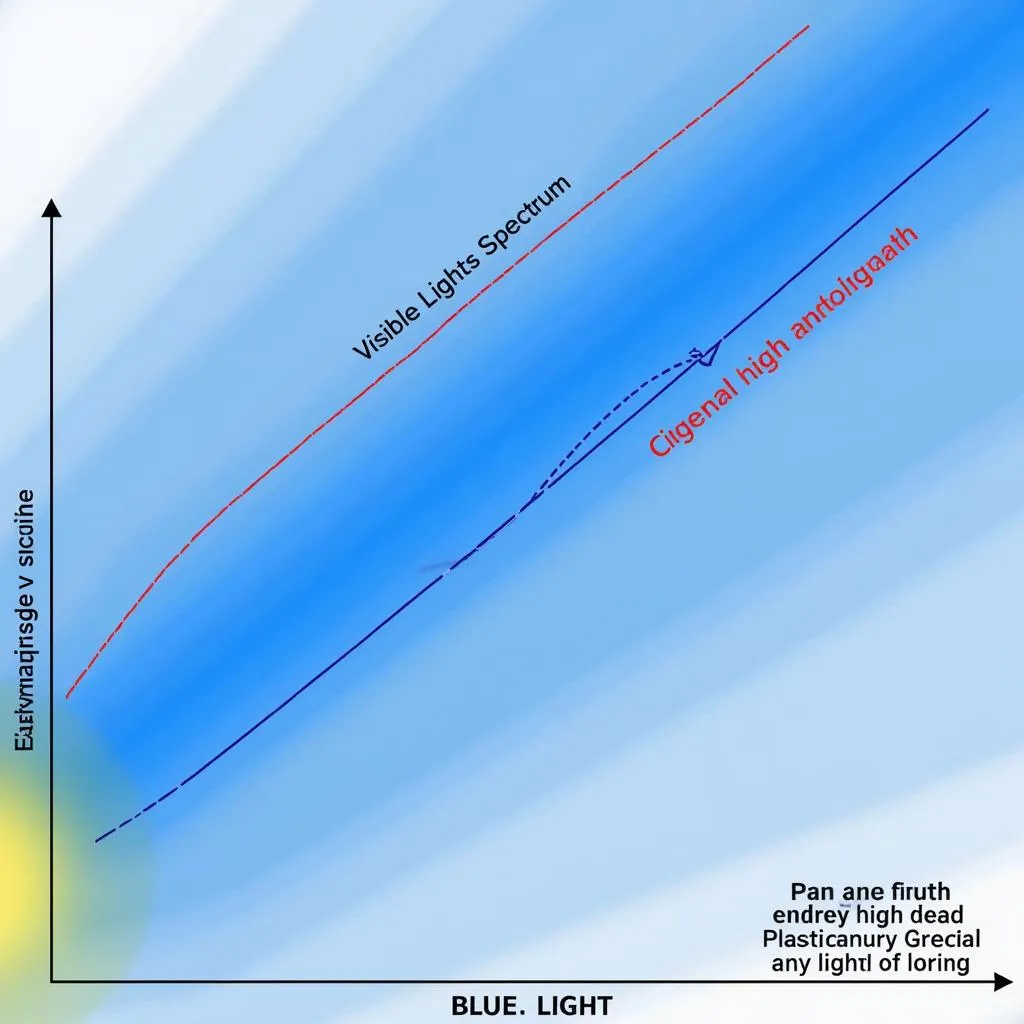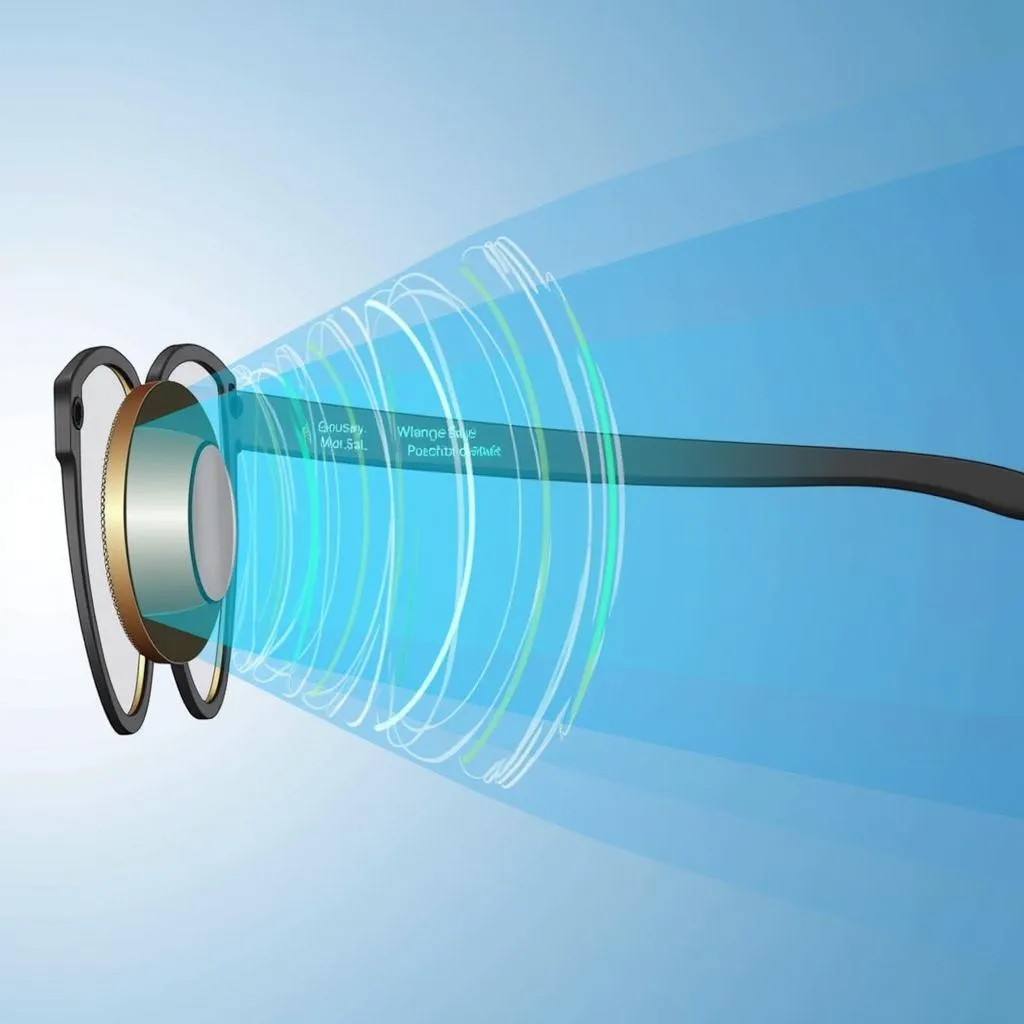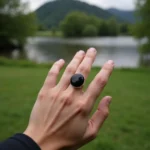Blue light glasses have become increasingly popular in recent years, touted for their ability to reduce eye strain and improve sleep quality. But a question often arises: do blue light glasses change color perception? Let’s delve into the science behind these glasses and how they interact with our vision.
Understanding Blue Light and Its Effects
Blue light is a high-energy light wavelength naturally emitted by the sun. It helps regulate our circadian rhythm, keeping us alert during the day and promoting sleep at night. However, artificial sources of blue light, such as smartphones, computers, and LED lights, expose us to excessive amounts, particularly in the evening.
 Blue light spectrum
Blue light spectrum
Prolonged exposure to blue light can lead to eye strain, headaches, and sleep disturbances. This is where blue light glasses come in. These glasses have special lenses designed to filter out a portion of the blue light emitted from digital screens.
How Blue Light Glasses Work
Blue light glasses work by selectively filtering out specific wavelengths of blue light. The lenses are typically coated with a layer of material that absorbs or reflects these wavelengths, preventing them from reaching your eyes. This filtering process reduces the amount of blue light entering your eyes, mitigating its potential negative effects.
 Blue light filtering mechanism
Blue light filtering mechanism
Do Blue Light Glasses Alter Color Perception?
While blue light glasses filter out a portion of blue light, they typically do not significantly alter your overall color perception. The lenses are designed to target the most harmful blue light wavelengths while allowing other colors to pass through relatively unaffected.
However, you may notice a slight yellowish or amber tint to your vision when wearing blue light glasses, particularly with glasses that offer a higher level of blue light filtration. This tint is a result of the filtering process and is generally temporary, fading as your eyes adjust.
Factors Affecting Color Perception with Blue Light Glasses
Several factors can influence how blue light glasses might affect your color perception:
- Lens Tint Intensity: Glasses with a darker amber or yellow tint may cause a more noticeable shift in color perception.
- Individual Sensitivity: Some individuals may be more sensitive to changes in color perception than others.
- Lighting Conditions: The surrounding lighting can also influence how colors appear when wearing blue light glasses.
Addressing Concerns about Color Accuracy
If you work in a profession that demands precise color accuracy, such as graphic design or photography, you might be concerned about the potential impact of blue light glasses.
 Professional using a color-calibrated monitor
Professional using a color-calibrated monitor
In such cases, it’s essential to choose blue light glasses with minimal color distortion. Look for glasses that specifically advertise their color accuracy or consult with an eye care professional to find the best option for your needs.
Conclusion
So, do blue light glasses change color perception? While they may cause a temporary and usually subtle shift in color, they generally don’t significantly alter your overall perception. If you’re concerned about color accuracy, opt for glasses with minimal color distortion or consult with an eye care professional.
By understanding how blue light glasses work and their potential impact on color perception, you can make an informed decision about whether they’re the right choice for you.
FAQs about Blue Light Glasses and Color Perception
1. Will blue light glasses make everything look yellow?
Blue light glasses may give your vision a slight yellowish tint, but this is usually temporary and fades as your eyes adjust.
2. Can I wear blue light glasses all the time?
While blue light glasses are generally safe for prolonged wear, it’s a good idea to take breaks and remove them periodically.
3. Do blue light glasses really improve sleep?
By reducing blue light exposure in the evening, blue light glasses can help regulate your sleep cycle and improve sleep quality.
4. Are blue light glasses worth it?
If you spend a lot of time in front of digital screens and experience eye strain, headaches, or sleep disturbances, blue light glasses may provide relief.
5. Can I get blue light filtering added to my prescription glasses?
Yes, many eye care professionals offer blue light filtering coatings that can be added to prescription lenses.
Do you want to learn more about how colors impact our lives? Check out these interesting reads:
Have more questions about eye health and color perception? Contact us at 0373298888, email us at [email protected], or visit us at 86 Cầu Giấy, Hà Nội. Our team is available 24/7 to assist you.

